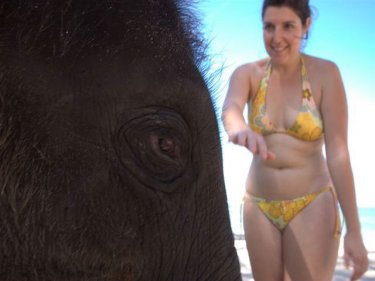Salary cutbacks are not yet widespread on Phuket this low season, resort sources say.
But the national election set for July 3 appears to have generated a wait-and-see approach among many tourists - and disquiet among resort managements.
There is palpable nervousness about what the future holds for Thailand.
''Given the options,'' says veteran Phuket hotelier Mathee Tanmanatragul, ''people who might have been expected to choose Phuket are opting for Bali or perhaps the Philippines.
''The world is at everyone's fingertips these days. You can see your home from Google. There are no secrets any more.''
Khun Mathee, immediate past-president of the southern chapter of the Thai Hotels Association, said that the uncertainty of the poll added to what people already know about Thailand's recent turbulent history.
Oversupply and rising salary costs are among the issues for Phuket resorts to address, Khun Matee said.
''The five-day week appears to be standard in resorts on Phuket,'' he said. ''While all the big brands have come to Phuket since the tsunami, which is good, the oversupply has continued to develop.
''Now it's not just resorts but also other accommodation growing at a fast pace, including serviced apartments and villas.
''Eighty percent of those villas are purchased for investment.''
Phuket's high season also still appears to be shrinking, Khun Matee said.
''I've just come back from Bali,'' he added. ''They have a 75-78 percent occupancy rate all year long and the control over growth in resorts appears to be much better managed.''
May and June are generally recognised as the worst months of the year for resort bookings on Phuket, with Patong usually maintaining a higher occupancy than most other Phuket beach destinations.
Several resorts on Phuket have taken the opportunity this low season to carry out renovations while reduced rates are widely available in the form of special offers that save guests as much as 50 percent.
Five-star and four-star resorts seem to be suffering more than other resorts with lower rates.
Australians continue to come to Phuket, but they usually stay in Patong or Karon and Kata, Khun Matee said, with the number of Russian charter flights falling away as Europe's summer approaches.
Koreans and Chinese are still holidaying on Phuket but the Scandinavian market also dries up at this time of the year, Khun Matee said. The Japanese market has disappeared since the March 11 tsunami.
''People do tend to go to the less expensive hotels these days,'' he said. ''Problems mostly seem to be at the high end.''
The letter to staff at the five star resort, seen by Phuketwan, is dated June 7 and headed ''Leave Without Pay.''
Signed by the resort's Director of Human Resources, the key paragraph says: ''All permanent employees receiving a monthly salary range from 25,000 baht and above must take four days compulsory leave without pay within the month of June and seven days compulsory leave without pay as of the following month until further notice.''
Some Phuket resorts that have previously been forced to shorten working weeks are not doing so this year.
As always, the quantity of low-season bookings around the region appear to rest on the efficiency of the resort's marketing staff, and the scale of discounts resorts are willing to take to keep cash flowing.
What's different this year is that fewer people are prepared to offer predictions about what the situation might be in tourism for the second half of the year and next high season on Phuket.





25,000 baht and above per month: I would assume that means all the management, including the human resources director, the chef etc. leaving the hotel to be run by the general staff earning less than 25k. Nice one.
Posted by Pete on June 10, 2011 19:42